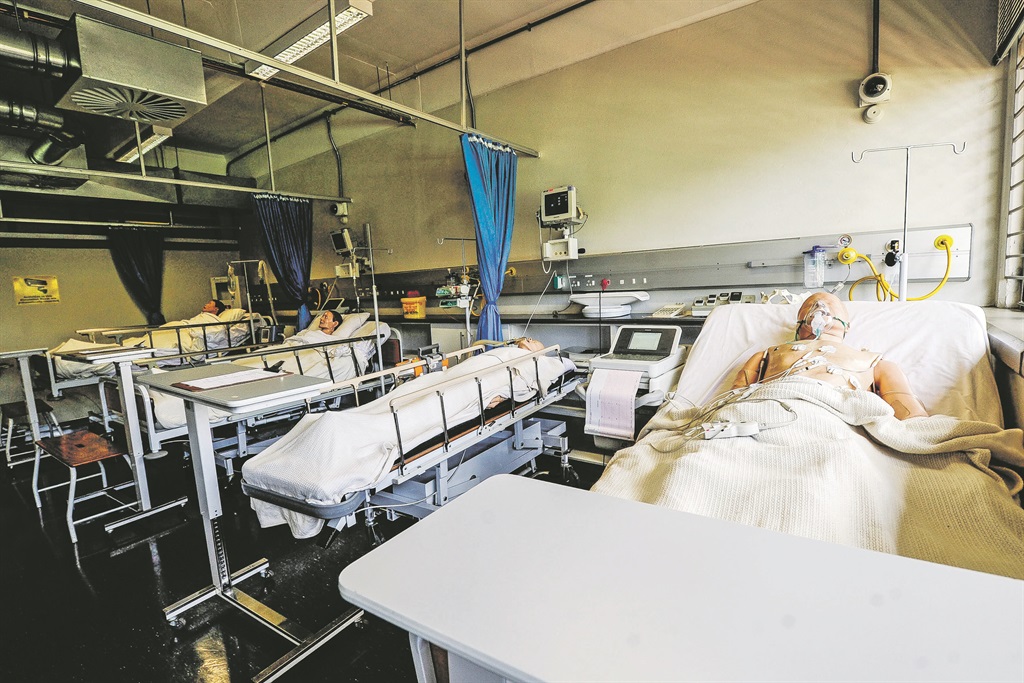
Zimbabwean citizens are bearing the brunt of the continuing standoff between striking junior doctors and the government over demands for a substantial salary increase as well as more staff, medical supplies and equipment.
The protracted strike by healthcare professionals, who have defied government orders to return to work, is leaving the country’s public hospitals – already stretched for resources because of the country’s economic situation – on the brink of a complete shutdown as soaring inflation, rolling blackouts and fuel shortages take their toll.
At Parirenyatwa Group of Hospitals, located in Harare – one of Zimbabwe’s two biggest referral hospitals in the capital – only a few emergencies are being attended to. Even then, patients have to negotiate pay with doctors and, in some instances, have had to bring in specialists from outside – a draining consequence of the two-month-and-counting defiance campaign being waged.
Such was the case for Tendai Liwombo, who developed pregnancy complications last week and had to be admitted for emergency surgery.
Her husband, Prince Masawi, was forced to bring in a specialist to administer the anaesthetic and buy most of the post-operative medicines required. To make matters worse, despite the couple’s desperate efforts, they lost their baby.
A devastated Masawi told City Press of the lengths he and his wife had to go to: “The hospital authorities said we should bring scans. My wife and I had to run around town looking for an affordable place to take X-rays. After we managed to get the X-rays, we were lucky enough to get a doctor to operate. But there was no anaesthetist, so we had to run around again to find one. We finally did, but he came from outside the hospital.”
Under normal circumstances, all these processes would be done in-house at Parirenyatwa, but because of the institution’s dilapidated infrastructure and equipment, most patients are at the mercy of private healthcare facilities and have to fork out hefty dollar-denominated fees for even basic services.
The upstairs floor at Parirenyatwa, which houses the gynaecological emergency observation wards, is virtually empty bar two or three patients, reflecting the horrendous effect of the standoff between medics and the state.
With no doctors to treat them, patients are being turned away in droves. Hospital officials at Parirenyatwa say they can only accommodate about 50 patients, mostly emergency cases. This falls far short of its usual capacity of 1 000-plus patients. Even when it is fully functional, though, the facility is often oversubscribed, with some patients having to sleep on the floor.
“Most patients are now bringing their own doctors here because those attached to the hospital are not reporting for duty. We have lost some patients because they have been unable to afford the foreign currency that doctors from outside have wanted as payment,” said one insider.
A nurse at Parirenyatwa, who declined to be named, said a child who had suffered a snake bite died because there was no doctor available to administer the antivenom.
The government has banned the media from visiting the hospital. Nelson Chamisa, leader of opposition party the Movement for Democratic Change, attracted the wrath of Zanu-PF for visiting patients at public hospitals.
At the centre of the dispute between junior medics and the state is the wage disagreement, with the doctors arguing that their salaries have lost value and, as a result, they have been incapacitated to report for duty.
The government has demanded that the doctors return to work while the two parties negotiate and settle the labour dispute, to no avail.
The junior medics are campaigning for their salaries, which amount to about $180 (R2 705), to be increased by 400% and for working conditions to be improved. They have rejected government’s offer of a 60% salary increase.
The state has responded by instituting disciplinary hearings for the striking doctors, most of whom have not turned up for them.
“They did not turn up for the hearings, but we are going ahead with them in the medics’ absence,” said a representative from the Health Services Board.
“We cannot disclose the outcome of the hearings.”
The government has repeated its threats to dismiss the doctors, with the country’s deputy minister of information, Energy Mutodi, saying: “The striking doctors can rest assured that once they are dismissed, there will be no rehiring by government.
“No one is above the law, no matter what their profession. If the court says ‘Go back to work’, you must comply. Government will also blacklist the money-mongering doctors so they are not employable elsewhere,” he said.
In keeping with this hardline stance, it was reported yesterday that the government had decided to fire at least 75 of the striking doctors who were among the first batch to have been summoned for the disciplinary hearings.
Medical doctor Mthabisi Bhebhe confirmed yesterday that the state had dismissed those medics who had failed to turn up for their hearings.
Legal and human rights campaigners told City Press that the government’s actions would only worsen the health sector’s dire situation. They urged the government to address the medics’ concerns and prioritise restoring the functionality of the public health sector.
Kumbirai Mafunda, of the Zimbabwe Lawyers for Human Rights, said yesterday that the “depressing situation at hospitals” was of major concern, given that access to healthcare was a basic human right.
“We urge government to resolve the situation speedily and capacitate medical practitioners, so that they can execute their duties and help save lives. The rights to health and life are fundamental rights which ought to be respected and enjoyed by citizens,” he said.
Members of the Senior Hospital Doctors’ Association have also spoken out about the consequences of government’s failure to address the demands of the junior doctors, and have voiced support for their junior counterparts.




 Publications
Publications
 Partners
Partners









